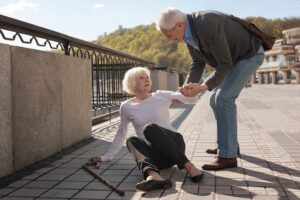What is STEADI, and Why Does it Matter to Caregivers?
Do you worry about your beloved mother or father taking a nose dive on the stairs, in the bath, or on the carpet? If so, you are not alone. Nor are your concerns in any way exaggerated.

Elder Care Westfield NJ – What is STEADI, and Why Does it Matter to Caregivers?
Falling is a grave risk to people over 65. And the risks associated with falling get ever worse as we cross the thresholds of seventy and then eighty. That’s why the Centers for Disease Control came up with a program called STEADI which stands for “Stop Elderly Accidents, Deaths, and Injuries.”
Three phases of STEADI
The STEADI program starts with an assessment of fall risk. This typically starts in the office of your mother or father’s primary care doctor. Patients are asked to complete a questionnaire. Key questions are:
- Has the individual fallen within the last year?
- How many times has he fallen?
- What kind of injuries, if any, were sustained in the fall?
- How worried about falling is this individual?
There are many fall risk factors, including medications, neurological conditions, chronic health conditions such as Parkinson’s disease, and osteoporosis, to name the most common.
Depending on how the over-65 patient answers the questions, he or she may be mandated to take Vitamin D supplements and possibly calcium supplements and participate in a community exercise program. Or he or she may be referred for physical therapy as well as vision checks, foot examinations, and other care.
The CDC has created an algorithm for assessing fall risk that you can read here: https://web.uri.edu/rigec/files/Resources-for-Professionals.pdf. However, the algorithm must be administered by a healthcare professional.
The next step is to inventory available resources that can reduce fall risks. This might include recommending modifications to a senior’s home. Falls often happen in the shower and bathtub. So the STEADI program might assess the safety of the senior’s shower or bathtub. This assessment might also look at stairs, throw rugs, unanchored furniture in the home, etc. that might pose a fall risk.
The third step in preventing falls with STEADI is to come up with a plan to reduce fall risks. This might include making modifications to the bathroom, such as installation of grab bars, a shower chair, and/or a walk-in bathtub. Interventions might also include exercise regimes designed to improve balance.
Elder care can help you implement STEADI
Qualified elder care individuals can help your parents with every step of the STEADI program, from getting your loved one to the doctor’s office to recommending home modifications, to helping your parents comply with medical recommendations.
Elder care professionals are well trained to understand the risk that falling poses to seniors, and they are often instrumental in helping to avoid the falls that endanger our loved ones.
In conclusion, the CDC’s STEADI program takes your senior through a thorough assessment and recommends changes to lifestyle and home infrastructure that can reduce fall risk. It is well worth asking your mother or father’s primary care physician to implement STEADI as a way of evaluating your loved one’s risk.
Sources: https://www.cdc.gov/steadi/about.html
https://www.aafp.org/afp/2017/0815/p220.html
https://www.ncbi.nlm.nih.gov/pmc/articles/PMC4707964/
https://web.uri.edu/rigec/files/Resources-for-Professionals.pdf
https://www.cdc.gov/falls/index.html?CDC_AA_refVal=https%3A%2F%2Fwww.cdc.gov%2Fhomeandrecreationalsafety%2Ffalls%2Findex.html
If you or an aging loved one are considering hiring professional Elder Care Services in Westfield NJ, please talk to the caring staff at Generations Home Health Care today. Providing Home Care in Somerset, Essex, Union, Morris and Hunterdon Counties. Call us today at (908) 290-0691 or (973) 241-4534.
- How to Stay Connected With a Senior Who Has Alzheimer’s - April 17, 2024
- Spring Cleaning Tips for Seniors - April 4, 2024
- How Personal Care Aides Can Help Prevent Infections In Seniors - March 20, 2024





